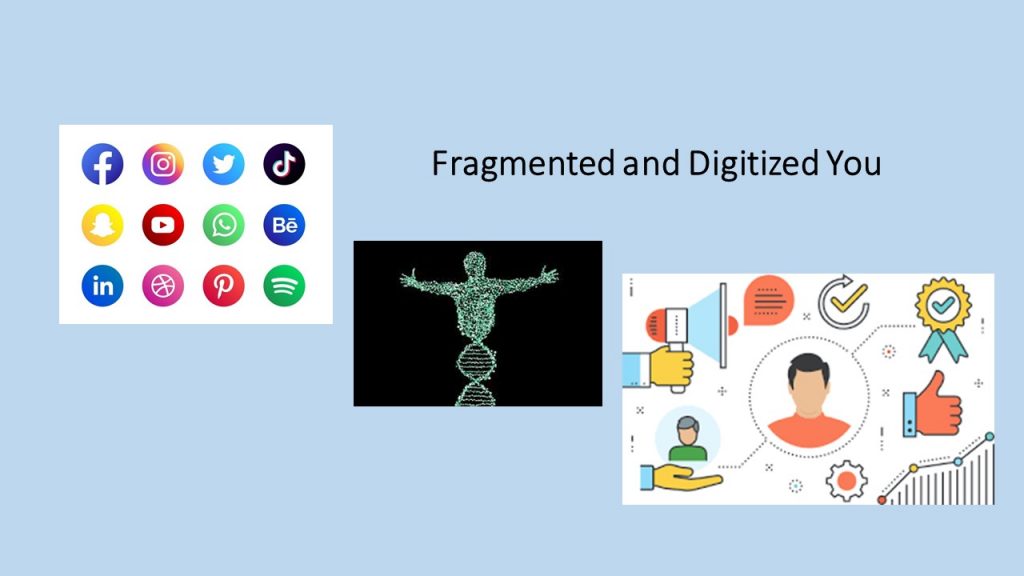
132. We are Fragmented and Digitized | 我們被瑣碎化和數位化了
– Musings of Dr. Jamie C. Hsu, 2.7.2022
Have you noticed a big tsunami happening in our lives for quite some time now? Our communications, work, leisure time, studies, and many other aspects of our lives have been fragmented and digitized into smaller and smaller pieces. This is very similar to how signals and communication formats have switched from analog to digital in order to accommodate higher volume and signal manipulations. For example, digital TVs are giving us better signals and can send hundreds of channels into our households.
Nowadays, we also receive our news, knowledge, and information in smaller chunks. We don’t sit for a long time waiting to be spoon-fed the news or movies. We can stream them, record them, watch them, pause, and skip as we wish. The same thing goes with education and learning. Vast amounts of books, training materials, and useful knowledge are digitized and stored for easy retrieval and use. Our entertainment, learning, and knowledge acquisition are all happening in smaller fragments.
Even the interactions with people have changed in a similar manner. We have less time to share with friends, colleagues, and family. We don’t write long letters or emails to communicate. We don’t sit down with friends to have a long chat over coffee. Instead, we rely more on a few words here, and a few sentences there, in Messenger, Twitter, WeChat, or Line to connect and converse with others. We can easily have hundreds of such exchanges a day with a variety of people. Our connections and impressions of others are being fragmented. It will take some effort in our minds to sort out these fragmented messages and impressions so we can integrate them into some sort of “holistic relationship” with others.
Most significantly and unsettlingly, we are all now being fragmented and digitized by a variety of social media, embedded electronic cookies, and profile analyzers. Bits and pieces of information about us are being stored in hundreds, even thousands, of computers and databases. Our family, our travels, eating habits, clothing preferences, friends, work experience, health, communications, and other things about us are being captured, digitized, and stored in different places unbeknownst to us. So many people now have a small glimpse of the “fragmented us” and can analyze it digitally for various purposes. This fragmentation and digitization may sound scary, but fortunately, only we ourselves have a total view and understanding of the wonderful total “me” in reality. We still own the total self, in spite of how we have been fragmented in the digital world.

我們被瑣碎化和數位化了(2022/02/07)
-作者 許俊宸博士
-中譯 薛乃綺
你有意識到在我們的生活中,不知不觉地發生了一件不得了的大事?我們的通訊、工作、休閒、學習和其他生活的方方面面,都被數位化切割,變得越來越細小。這與信號及通訊格式從模擬轉換成為數字的方式很相似,為了適應及處理更大量規模的信息。例如數位電視,它為我們提供了更好的信號,可以將數百個頻道發送到各個家庭。
如今,我們也以更瑣碎的方式,接收新聞、知識、和訊息。我們不需要坐著花很長時間來吸收新聞或電影;而可以隨時隨意撥放、錄製、觀看、暫停甚至快/倒轉。教育和學習也是一樣的道理。大量的書籍、培訓教材、和有用的知識,都被數字化和存儲,以便於檢索和使用。我們獲取娛樂、學習和知識訊息,都發生在更瑣碎的片段中。
甚至人與人的互動也用類似的方式發生了變化。我們跟朋友、同事、和家人分享的的時間變得更碎少了。我們不會寫長長的信件或email來溝通、也鮮少和朋友坐下來喝咖啡長談。取而代之,我們更依賴幾個新玩意,像是Messenger、Twitter、WeChat、或Line,用幾句話來跟別人聯繫交談。我們每天可以輕鬆地和各式各樣的人進行上百次類似這樣的交流。我們跟別人的溝通、還有感想,也因為這樣變得零散瑣碎。我們需要花些時間,努力整理這些零散的訊息和感想,以便我們可以將它們整合到跟別人的某種”整體關係”。
最严重、最可怕的是,我們的个人現在都已經被各種社交媒體、網頁瀏覽器紀錄、個資分析器等綁架,變得零散瑣碎。關於我們點點滴滴的訊息,被儲存在數百、甚至上千台電腦及資料庫中。我們的家人、旅遊、飲食習慣、服裝偏好、交友、工作經驗、健康、通訊以及其他關於個人的信息,正在被獲取、數位化,而且被儲存在我們不知道的許多地方。外面很多人對於我們這個人有了零散瑣碎的認知,而且可以出於各種目的對我們進行數位化分析。諸如此類的零散瑣碎可能聽起來很可怕,但幸運的是,只有我們自己才能清楚了解身在現實中的自己是有多完全有多棒!


